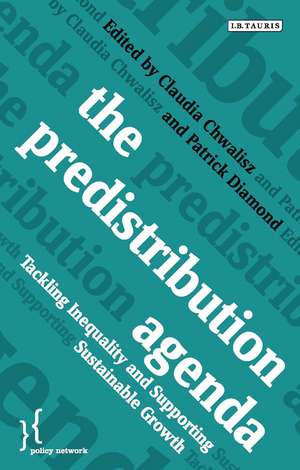The Predistribution Agenda: Tackling Inequality and Supporting Sustainable Growth
Editat de Patrick Diamond, Claudia Chwaliszen Limba Engleză Paperback – 15 sep 2015
Preț: 147.81 lei
Preț vechi: 154.79 lei
-5% Nou
Puncte Express: 222
Preț estimativ în valută:
28.28€ • 29.61$ • 23.40£
28.28€ • 29.61$ • 23.40£
Carte disponibilă
Livrare economică 15-29 martie
Preluare comenzi: 021 569.72.76
Specificații
ISBN-13: 9781784534417
ISBN-10: 1784534412
Pagini: 304
Dimensiuni: 138 x 216 x 25 mm
Greutate: 0.39 kg
Editura: Bloomsbury Publishing
Colecția I.B.Tauris
Locul publicării:London, United Kingdom
ISBN-10: 1784534412
Pagini: 304
Dimensiuni: 138 x 216 x 25 mm
Greutate: 0.39 kg
Editura: Bloomsbury Publishing
Colecția I.B.Tauris
Locul publicării:London, United Kingdom
Notă biografică
Claudia Chwalisz is Policy Researcher at Policy Network. Patrick Diamond is Vice Chair of Policy Network and Lecturer in Public Policy at Queen Mary, University of London. He is the former Head of Policy Planning in 10 Downing Street and Senior Policy Adviser to the Prime Minister.
Cuprins
Table of Contents*Preface by Ernst StetterForeword: The promise of predistribution by Jacob HackerIntroductionPre-distribution: A new governing prospectus for the centre-left by Patrick Diamond, Claudia Chwalisz and Michael McTernanWelfare states after the crisis by Andrew GamblePart I: Future changes in welfare societies 1. Public opinion, pre-distribution and progressive taxation: Distributional politics and voter preferences after the financial crisis by Lucy Barnes2. Progressive policies for intergenerational justice in ageing societies: Demography is not destiny by Pieter VanhuyssePart II: Welfare states after the crisis: A pre-distribution agenda?3. Pre-distribution and redistribution: Alternative or complementary policies? By Evelyne Huber and John D. Stephens4. The potential and limits of pre-distribution in the UK: Tackling inequality and poverty by Paul GreggPart III: Pre-distributive labour market policies5. Fostering equitable labour market outcomes: A focus on raising employment by Paul de Beer6. Labour market flexibility and income security in old age: The policy and political challenges of pension reform by Karen Anderson7. Technology, the labour market and inequality: Ensuring the benefits of new technology are widely shared by Alan Manning8. Labour market institutions as pillars of pre-distribution: Focusing on pre-tax income distribution to tackle inequality by Rémi Bazillier9. Pre-distribution and labour market actors: Looking at the trade union movement by Dimitris TsarouhasPart IV: Pre-distribution and the social investment state10. Social investment, skills and inequality: The importance of institutional design by Marius Busemeyer11. Looking to the Nordics? The Swedish social investment model in view of 2030 by Ingrid Esser12. The demography of pre-distribution: Families, economic inequalities and social policies by Sophie Moullin13. A 'family-friendly' welfare state: Addressing the gender equality paradox by Anke HasselPart V: The politics of pre-distribution14. The political economy of the service transition: New political coalitions for pre-distributive strategies by Anne Wren15. Welfare futures, Changing needs, risks and tools: Innovation and the new welfare state by Geoff Mulgan16. Future challenges in new welfare societies by Ania SkrzypekConclusionPostscript: The future of the welfare state by Peter A. Hall
















